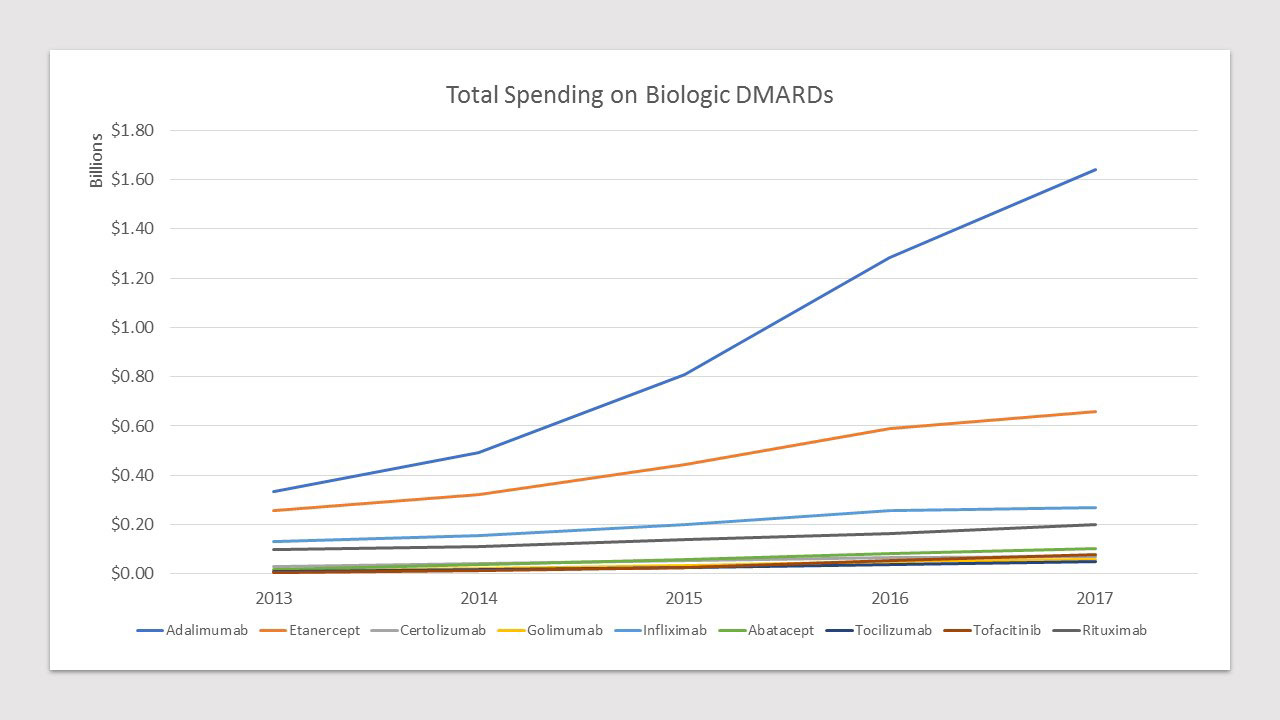Session Information
Session Type: Poster Session (Monday)
Session Time: 9:00AM-11:00AM
Background/Purpose: The management of rheumatoid arthritis (RA) and other conditions have improved tremendously since the introduction of biologic disease modifying agents (DMARDs). However, these agents command a substantial price, adding more $20,000 to direct medical care costs in people with RA. We examined recent trends in Medicaid (public health insurance for low income US citizens) spending on DMARDs in this era of biologics.
Methods: We compiled data from 5 years (2013-17) of publicly available Medicaid spending reports: total expenditures (before rebates), unit costs, and doses dispensed at the product level. Expenditures were summed and compared between conventional and biologics DMARDs.
Results: Spending on conventional DMARDs increased from $24.2 million to $92.3 million (Fig 1): two-thirds was attributable to hydroxychloroquine which experienced a substantial increase in the price/unit ($0.22 to $1.31). Leflunomide unit costs also more than doubled and spending increased 4.4-fold. Methotrexate and sulfasalazine unit costs were stable.
Spending on biologics increased from $894 million to $3.1 billion: driven by a 5-fold increase in total spending on adalimumab whose cost/unit doubled (Fig 2). Spending on etanercept and infliximab increased more than doubled, unit cost increased by 82% and 45% respectively. Total spending on abatacept increased 5-folds ($19 million to $102 million).
Conclusion: Biologic agents has pushed Medicaid’s expenditures for DMARDs from $918.2 million to more than $3 billion in just 5 years. Two conventional DMARDs had substantial unit cost increases, but their expenditure level remained a fraction (3%) of total DMARD spending. While not all of the biologics were used for RA, these increases should be carefully considered relative to their clinical benefit.
To cite this abstract in AMA style:
Dalal D, Zhang T, Shireman T. Medicaid Spending (2013-2017) on Disease Modifying Agents Commonly Used in Rheumatoid Arthritis [abstract]. Arthritis Rheumatol. 2019; 71 (suppl 10). https://acrabstracts.org/abstract/medicaid-spending-2013-2017-on-disease-modifying-agents-commonly-used-in-rheumatoid-arthritis/. Accessed .« Back to 2019 ACR/ARP Annual Meeting
ACR Meeting Abstracts - https://acrabstracts.org/abstract/medicaid-spending-2013-2017-on-disease-modifying-agents-commonly-used-in-rheumatoid-arthritis/


